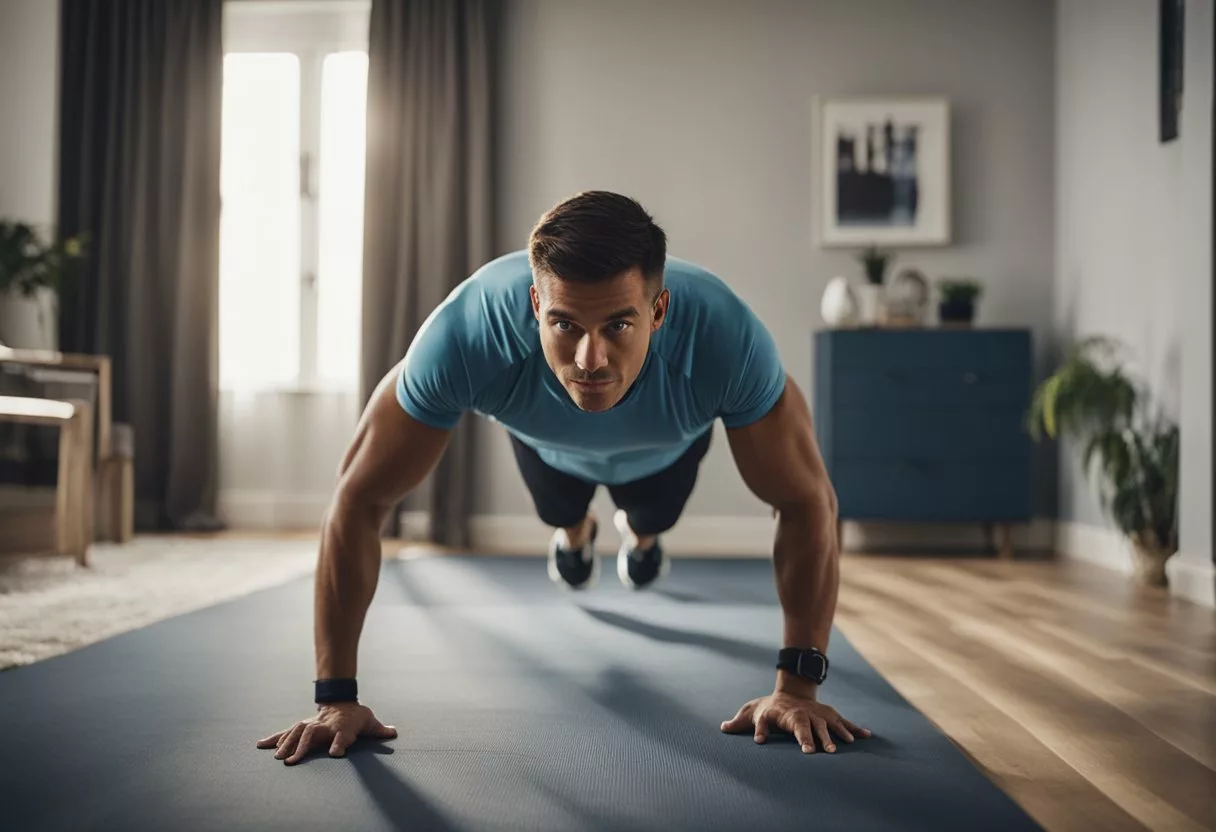When it comes to enhancing sexual performance, many seek ways to last longer in bed. Strengthening your pelvic floor muscles through Kegel exercises can provide better control over ejaculation. These exercises involve tensing and stopping the flow of urine for a few seconds, which can be practiced regularly to improve sexual endurance.

Behavioral techniques, such as adopting new sexual positions and exploring different methods, can also greatly improve sexual stamina. Trying techniques like the squeeze method, which involves squeezing the head of the penis when nearing orgasm, can delay ejaculation and prolong the experience. Additionally, practicing breathing exercises during intimate moments can help maintain control and reduce anxiety.
Making lifestyle changes, such as exercising regularly and maintaining a healthy diet, contributes to overall sexual health. Avoiding excessive alcohol and smoking can also improve performance. For those seeking medical advice, it’s important to consult a healthcare professional for tailored recommendations and treatments for lasting longer in bed.
Key Takeaways
- Strengthening pelvic floor muscles can improve ejaculation control.
- Behavioral techniques like the squeeze method can help delay orgasm.
- Healthy lifestyle changes benefit overall sexual performance.
Understanding the Basics

To address the goal of lasting longer in bed, it is important to comprehend the foundational aspects affecting sexual performance. Key areas include the definition of premature ejaculation, how age affects sexual stamina, and the psychological impact on sexual endurance.
Defining Premature Ejaculation
Premature ejaculation occurs when a man ejaculates sooner during sexual activity than he or his partner desires. It is a common issue that can impact sexual satisfaction and pleasure for both partners. Clinically, it is often defined as ejaculating within one minute of penetration. Understanding this condition helps individuals recognize that it is a treatable problem and not just a lack of self-control. Premature ejaculation can result from various factors including psychological, physiological, or a combination of both. Addressing it might involve techniques, medications, or therapy, depending on the underlying cause.
Age and Sexual Performance
Age can significantly influence sexual performance and stamina. As men age, testosterone levels tend to decrease, which can affect erectile function and overall sexual drive. Younger men may experience more frequent and intense sexual arousal, while older men might face challenges such as erectile dysfunction or delayed ejaculation. It’s important to note that aging is a natural process and does not mean the end of a satisfying sexual life. Many older adults enjoy fulfilling sexual experiences by adapting to these changes and incorporating healthy lifestyle choices like regular exercise, a balanced diet, and open communication with partners.
The Role of the Mind in Sexual Stamina
Psychological factors play a crucial role in sexual stamina and performance. Anxiety, stress, and depression can significantly impact a person’s ability to maintain an erection or delay ejaculation. Mental health conditions can create a mental barrier, making it difficult to focus on sexual pleasure. Techniques such as mindfulness, meditation, and cognitive-behavioral therapy (CBT) can help manage these psychological challenges. Addressing mental health is key to improving overall sexual satisfaction. Individuals are encouraged to seek professional help if they notice that their mental state is affecting their sexual performance.
Behavioral Techniques

Behavioral techniques can help individuals manage ejaculatory control and increase their endurance during sexual activity. These methods involve understanding body signals and employing specific actions to delay climax.
The Start-Stop Method
The Start-Stop Method is a technique that helps delay ejaculation by interrupting stimulation. When a person feels they are close to orgasm, they should stop all sexual activity. This pause allows the arousal level to decrease. After a few moments of rest, they can resume stimulation.
This method trains the body to recognize the sensations leading up to ejaculation and helps in managing the excitement. By practicing this technique regularly, individuals can learn to last longer during sex. It requires patience and communication between partners to be most effective.
The Squeeze Technique
The Squeeze Technique involves applying pressure to the penis to delay ejaculation. When a person feels they are about to climax, either they or their partner should squeeze the base or the tip of the penis until the urge subsides.
This technique aims to reduce the immediate need to ejaculate by momentarily decreasing blood flow. Effective use of the Squeeze Technique requires practice and timing. Frequent use of this method can lead to improved control over ejaculation and longer-lasting sexual encounters.
Edging Techniques
Edging techniques involve bringing oneself to the brink of orgasm and then stopping before climaxing. This cycle of approaching climax and then easing off helps in building endurance. By repeating this process several times in one session, individuals can extend the duration of sexual activity.
Edging trains the body to manage high arousal levels without reaching orgasm prematurely. This method is effective in teaching control and enhancing the overall sexual experience. Regular practice of edging can lead to better ejaculatory control and longer, more fulfilling intimate moments.
Physical Exercises

Improving sexual stamina and endurance can be achieved by focusing on specific physical exercises. Building strength in the pelvic floor muscles and maintaining overall fitness are key components.
Kegel Exercises for Men
Kegel exercises are specifically designed to strengthen the pelvic floor muscles. These exercises involve repeatedly contracting and relaxing the muscles that control urine flow. Men can perform Kegels by identifying the pelvic floor muscles, which can be felt by stopping urination mid-stream.
Once identified, contract these muscles for five seconds, then relax for five seconds. Aim for three sets of 10 repetitions each day. Consistent practice can lead to better control during penetration, potentially increasing sexual endurance.
Pelvic Floor Exercises
Pelvic floor exercises, including Kegel exercises, target the group of muscles that support the bladder and bowel. These exercises are crucial for improving muscle tone and functionality, which can enhance control over ejaculation and improve overall sexual performance.
One effective method involves tensing and holding the pelvic floor muscles for five to ten seconds, then relaxing them for the same amount of time. This can be done while urinating or at other times during the day. Over time, these exercises can help build endurance and stamina.
Exercise and Fitness Impact
Regular exercise and maintaining healthy lifestyle habits are essential for sexual endurance. Cardiovascular exercises, such as running and swimming, improve circulation and stamina, which are important for longer-lasting performance in bed.
Strength training, including exercises like squats and lunges, can also benefit by building overall muscle strength and stability. A balanced fitness routine that incorporates both cardio and strength training can lead to better sexual health and performance.
Regular exercise has the added benefit of reducing stress, which can improve sexual function and satisfaction. Integrating these exercises into a daily routine can support better endurance, enhancing overall sexual experiences. For more detailed routines, visit Healthline.
Psychological Interventions
Psychological interventions can significantly help in managing performance anxiety and enhancing sexual stamina. Key approaches include therapy options, meditation, and addressing performance anxiety, which work together to improve mental health and reduce stress.
Therapy Options
Psychotherapy, often referred to as talk therapy, can be a powerful tool in addressing sexual dysfunction. Cognitive-behavioral therapy (CBT) is particularly effective. CBT helps individuals identify and change negative thought patterns related to sexual performance. This can decrease anxiety and increase confidence during sexual activities.
Another option is sex therapy, where therapists specialize in addressing sexual issues. They can work with both individuals and couples to improve communication and reduce fears associated with sexual performance. Regular therapy sessions can help build a positive mindset and reduce stress-related barriers to sexual endurance.
Meditation and Deep Breathing
Meditation and deep breathing exercises are excellent methods for reducing stress and anxiety. These techniques focus on calming the mind and promoting relaxation. Practicing mindfulness meditation helps individuals stay present, reducing worries about performance and allowing for a more enjoyable experience.
Deep breathing exercises involve slow, deep breaths that can reduce anxiety levels. This technique lowers the heart rate and promotes a state of calm. Regular practice can improve mental clarity and reduce the physiological symptoms of anxiety, such as rapid heartbeat or muscle tension.
Addressing Performance Anxiety
Performance anxiety is a common issue that affects sexual endurance. It stems from fears about not meeting one’s own or a partner’s expectations. This anxiety can lead to premature ejaculation or difficulty maintaining an erection.
Addressing performance anxiety involves building self-esteem and reducing negative thoughts. Positive self-talk and setting realistic expectations can aid in overcoming these fears. Communication with a partner about sexual preferences and concerns is also crucial. Understanding each other’s needs can reduce pressure and create a more supportive, relaxed environment.
By implementing these psychological interventions, individuals can reduce anxiety and stress, enhancing their sexual performance and satisfaction.
Medical and Alternative Treatments
To address lasting longer in bed, various treatments are available. These include medications, therapeutic use of sex toys, and lifestyle changes with supplements.
Medication and Topical Agents
Certain medications can help men last longer in bed. Prescription medications for erectile dysfunction, like sildenafil (Viagra) and tadalafil (Cialis), can enhance performance by improving blood flow. However, these drugs might not suit everyone, especially those with high blood pressure.
Topical agents like numbing creams or sprays containing benzocaine or lidocaine help delay ejaculation. These agents reduce sensitivity, allowing men to last longer. Brands such as Promescent offer these products, but users should follow usage instructions to avoid over-numbing.
Therapeutic Use of Sex Toys
Sex toys can be a useful tool in enhancing sexual endurance. For example, penis rings can maintain erections and delay ejaculation by restricting blood flow. Additionally, strokers and other masturbatory aids can help men practice control in a solo setting.
Vibrating toys can also assist by providing varied stimulation, which can train the user to manage arousal levels better. While incorporating these tools, communication with a partner is critical to ensure mutual satisfaction and comfort.
Lifestyle Changes and Supplements
Lifestyle changes can significantly impact sexual performance. Regular exercise improves blood flow and cardiovascular health, which is vital for maintaining erections. Weight loss can also help in combating erectile dysfunction, especially for those with medical conditions like diabetes.
Reducing alcohol intake and avoiding recreational drugs can also have positive effects. For some, acupuncture and therapy to manage depression and stress may improve sexual performance. Supplements like L-arginine, ginseng, and zinc are sometimes recommended, but it’s essential to consult a healthcare provider before starting any new supplement regimen.
Practical Sexual Techniques

To increase endurance during sexual activities, it is important to follow methods that help delay climax and enhance pleasure. These include masturbation practices, selecting suitable sexual positions, and incorporating foreplay and non-penetrative sex.
Masturbation Practices for Control
Practicing specific masturbation techniques can help control the timing of orgasm. Edging, for example, involves stimulating oneself until approaching orgasm, then stopping to let the arousal subside. This practice can train the body to delay climax and build endurance during sex.
Kegel exercises are another effective technique. These exercises involve contracting and relaxing the pelvic floor muscles multiple times daily. Strengthened pelvic muscles can improve control over ejaculation.
Using sex toys or varying manual stimulation techniques can also provide different forms of arousal, helping to improve stamina over time.
Choosing the Right Sexual Positions
Certain sexual positions can help maintain control and delay orgasm. Positions where either partner can slow down or stop movement are particularly beneficial. For instance, the “doggy style” position allows the receiving partner to move at their preferred pace.
Positions where the person receiving penetration is on top, such as “woman on top”, allow for better control, as they can modulate pressure and speed.
Changing positions during intercourse can also prolong the experience by providing moments to pause and reduce stimulation.
Role of Foreplay and Non-Penetrative Sex
Foreplay is essential for building sexual arousal and ensuring a more satisfying experience. Manual stimulation or clitoral stimulation can significantly enhance arousal without leading directly to penetration, which helps in delaying orgasm.
Sex toys can also play a role in extending the sexual experience. Introducing toys that focus on areas other than the genitals can heighten arousal and pleasure.
Incorporating non-penetrative activities like kissing, massaging, and using erotic talk can extend the buildup to intercourse, making the overall experience longer and more fulfilling.
Foreplay and non-penetrative sex are not only important for delaying orgasm but also for creating a deeper connection between partners.
Enhancing Overall Sexual Health

Improving sexual health involves focusing on both physical and mental well-being. This includes adopting a healthy lifestyle, managing health conditions that impact sexual function, and seeking professional support when needed.
Importance of a Healthy Lifestyle
Maintaining a healthy lifestyle is crucial for enhancing sexual stamina and performance. Regular exercise improves fitness and boosts erectile function by increasing blood flow. A balanced diet rich in fruits, vegetables, and lean proteins supports overall health and helps maintain hormonal balance. Reducing or avoiding alcohol and quitting smoking can also benefit sexual health. Good sleep hygiene and stress management techniques such as deep breathing and meditation aid in reducing anxiety that can interfere with sexual activities.
Managing Conditions Impacting Sexual Health
Medical conditions like diabetes, cardiovascular diseases, and hormonal imbalances can affect sexual performance. Managing these conditions through medication, lifestyle changes, and regular medical check-ups is essential. Psychological factors such as stress, anxiety, and depression also play a significant role in sexual health. Mental health should be addressed through therapy, counseling, or mindfulness exercises like visualization. Regular medical consultations and newsletters from health organizations can provide useful tips for managing these conditions effectively.
Professional Help and Resources
Seeking professional help can provide targeted solutions for sexual health concerns. Physicians can offer guidance on desensitizing sprays, medications, and appropriate condoms. Therapists can address psychological issues, providing strategies to cope with stress and improve sexual activities. Resources such as online forums, health websites, and medical newsletters can offer information and support. Consulting a sexual health specialist ensures personalized and effective treatment plans for enhancing sexual endurance and performance.
Advanced Knowledge
Experts and researchers have delved deeply into techniques and strategies for lasting longer in bed. Notable organizations have provided insights that can help improve sexual endurance and manage sexual dysfunction.
Academic Perspectives
The American Urological Association emphasizes the impact of physical factors on sexual performance. Sex therapy and exercises, such as pelvic floor workouts, are recommended to increase intravaginal ejaculatory latency time (IELT). Sexual medicine specialists often point to the benefits of these practices in managing sexual dysfunction.
The International Society of Sexual Medicine supports behavioral methods like the stop-start technique. Educating oneself about the body’s responses can contribute to a more fulfilling sex life. Understanding the connection between the mind and body is crucial, and professionals often use sex therapy to address both psychological and physical aspects.
Current Research and Insights
Recent studies highlight various techniques for improving endurance. Researchers have identified intravaginal ejaculatory latency time (IELT) as a key metric. Pelvic exercises that strengthen muscles supporting the bladder can help in delaying ejaculation.
Psychological techniques, including meditation and mindfulness, are crucial. Managing stress and anxiety positively affects sexual performance. Doctors often recommend these practices for men experiencing performance issues.
Exploring different sexual techniques and positions can also add variety and excitement, preventing monotony. Studies show that exploring different techniques can lead to longer-lasting encounters and a more satisfied relationship. This experimentation helps maintain the spark and excitement in a partnership, further contributing to sexual fulfillment.
Creating a Personalized Plan

A personalized plan can help individuals improve their sexual satisfaction and manage frustration related to sexual performance. This involves setting realistic goals, using biofeedback techniques, and tracking progress to make necessary adjustments.
Setting Achievable Goals
Setting achievable goals is crucial for improving sexual endurance. Start by identifying specific areas that need improvement. For example, one goal might be to extend the refractory period or reduce feelings of shame and frustration during intimacy.
- Be Realistic: Goals should be realistic and attainable within a reasonable timeframe.
- Incremental Targets: Break down objectives into smaller, manageable targets. For instance, aim to increase sexual endurance by a few minutes before reaching more significant milestones.
- Communicate with Partner: Discuss goals with your partner to ensure both parties are on the same page. This can enhance mutual understanding and provide additional support.
Tracking Progress and Adjustments
Tracking progress helps to see what works and what needs change. Regularly monitor your performance and make adjustments as needed.
- Maintain a Journal: Keep a detailed journal of your sexual encounters, noting duration, techniques used, and feelings of satisfaction or frustration.
- Biofeedback Techniques: Consider using biofeedback devices to get real-time insights into your physiological responses.
- Adjust Techniques: If certain techniques aren’t working, be flexible and try new methods. For instance, edging and kegel exercises can be very effective.
Regular review of your progress and willingness to adapt can significantly enhance your sexual performance, leading to greater satisfaction and reduced frustration.
Frequently Asked Questions

Explore various tips and methods, from physical exercises and dietary choices to mental strategies, that can help in enhancing sexual performance and endurance.
What are effective techniques for managing premature ejaculation?
Effective techniques include practicing the “start-stop” method, where stimulation is paused to delay orgasm. Another technique is the “squeeze” method, where pressure is applied to the base of the penis. Desensitizing creams or sprays can sometimes help as well.
Can certain foods or supplements improve stamina during intercourse?
Certain foods, like bananas and avocados, are known to boost energy and stamina. Foods rich in omega-3 fatty acids, like salmon, can also be beneficial. Supplements containing zinc or L-arginine may improve sexual performance.
Are there specific exercises that can help in prolonging sexual performance?
Pelvic floor exercises, often called Kegels, can strengthen the muscles involved in ejaculation. Practicing these regularly can support better control. Additionally, general fitness exercises like cardio can aid in stamina and endurance.
How does mental or emotional state affect sexual endurance?
Stress, anxiety, and depression can negatively impact sexual performance. Mental health directly influences libido and energy levels. Addressing mental well-being through therapy or relaxation techniques can enhance sexual stamina.
What are the most common treatments recommended by healthcare professionals for enhancing sexual stamina?
Doctors may recommend medications such as selective serotonin reuptake inhibitors (SSRIs) or other prescriptions. Counseling or therapy to address psychological factors is also common. In some cases, physical therapy focusing on the pelvic area may be suggested.
How does one practice mindfulness or breathing techniques to maintain control during sexual activity?
Mindfulness practices involve staying present and focused during sexual activity, reducing anxiety. Breathing techniques, such as slow and deep breaths, can help maintain control and delay ejaculation. Regular practice of these techniques can lead to improved performance.